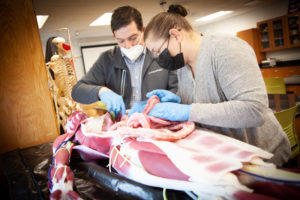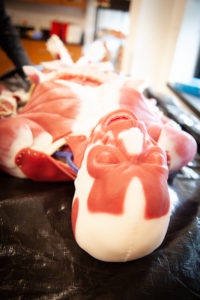 March 1, 2022 (Middletown, Conn.) — Middlesex Community College acquired a synthetic human anatomy model to enhance laboratory and online educational experiences for students enrolled in forensic sciences, anatomy and biological sciences courses.
March 1, 2022 (Middletown, Conn.) — Middlesex Community College acquired a synthetic human anatomy model to enhance laboratory and online educational experiences for students enrolled in forensic sciences, anatomy and biological sciences courses.
“The college is excited to offer state-of-the-art technology to our students, allowing them to attain a unique understanding of human anatomy during online course sections and videos, as well as during in-person labs,” said Rebecca Rist-Brown, criminal justice program coordinator at Middlesex. “This technological investment for our programs strengthens remote learning for our students and provides them with near real-life experiences.”
Manufactured by SynDaver®, the silicone educational human model was purchased using a portion of the federal Higher Education Emergency Relief Funds (HEERF) grant the college received last fall. Since Covid has limited the number of students in labs, the model will also be used in online tutorials and presentations.
 The life-sized human cadaver, nicknamed “Dave,” includes modeling of major skeletal muscles, bones, joints, organs and tendons that simulate the size and shape of a real human body. It also has arteries, veins and nerves.
The life-sized human cadaver, nicknamed “Dave,” includes modeling of major skeletal muscles, bones, joints, organs and tendons that simulate the size and shape of a real human body. It also has arteries, veins and nerves.
“Dave will be used in my forensic science class during our unit on autopsies starting this spring,” said Rist-Brown.
The forensics course is part of the criminal justice degree program and focuses on developing the scientific vocabulary and analysis necessary for investigators to communicate with scientists when solving crimes.
As an educational tool, Dave partners with the college’s SynDaver canine model that the veterinary technology program acquired in 2017.
During that year, Middlesex vet tech students were among the first in the nation to use a SynDaver canine model as an educational device. The college purchased the synthetic canine cadaver, now known as “Tessa,” through the Perkins Career and Education Grant.
According to Amy Levensaler, the vet tech program’s technician, Tessa underwent refurbishing during the past year. Tessa is now located at the program’s new clinical facilities at the Pieper Veterinary Berlin Street office in Middletown.
“She is the closest thing we have to a real animal to practice on in our clinical lab space,” added Levensaler.
The human and canine models share unique value as important technological resources for students in both online and laboratory settings at Middlesex Community College.
For more information about the criminal justice and veterinary technology programs at Middlesex, please visit mxcc.edu.
Since 1966, Middlesex Community College has provided high-quality, affordable and accessible education to a diverse population, enhancing the strengths of individuals through degree, certificate and lifelong learning programs that lead to university transfer, employment, and an enriched awareness of our shared responsibilities as global citizens. A part of the Connecticut State Colleges and Universities system, MxCC offers more than 70 degree or certificate programs at the main 35-acre campus in Middletown, MxCC@Platt in Meriden and online.

